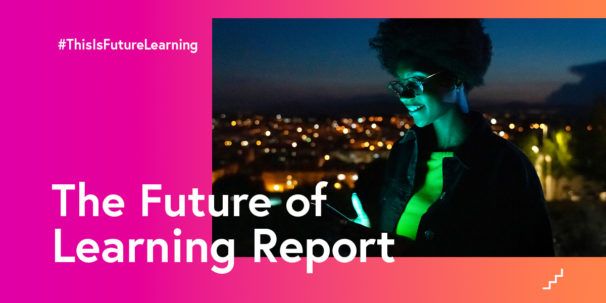Self-education, online learning, and the future of education

The COVID-19 pandemic has changed our society in a host of different ways. As people around the world have adjusted to new ways of working, studying, and socialising, we’re seeing new trends emerge and develop. But what do these changes mean for the way we approach education, now and in the future?
In 2020, FutureLearn commissioned YouGov to undertake a global study to interrogate and explore the future of learning. The main themes of this study were those of personal development and career aspirations, the power of education and online learning, and expectations for education in the future.
In an upcoming post, we’ll explore the areas of personal and professional development. In this one, we’ll focus on current attitudes towards self-education and online learning, as well as views on the future of education.
The data
For this study, adults from the UK, US and Australia were surveyed online between the 2nd and 7th of December. Sampling quotas were placed on age, gender and region, (as well as socio-economic status in the UK) to ensure a representative sample size. You can find the full Future of Learning report as a downloadable PDF for
Self-education more popular among younger generations
In the digital age, it’s clear that self-education is far easier than ever before. Much of this is driven by access to around-the-clock news and a host of different websites providing a constant stream of information.
Perhaps unsurprisingly, social media plays a significant role in this self-education. The report found that sites such as YouTube, Facebook, Twitter and Instagram were the most commonly used platforms that people use to educate themselves on key issues.
In all countries, the digital platforms most commonly used to educate themselves about issues around the environment and social justice are YouTube and Facebook
Again, as you might expect, the report also showed that there is a generational divide between the platforms people choose for this form of learning. Millennials (those born between 1981 and 1996) and those from Generation Z (those born from 1997 onwards) are far more likely to use each platform for self-education. For example, 37% of Generation Z and 22% of Millennials use Instagram, while only 4% of people from older generations do the same.
Online learning can provide similar benefits to formal education
As we’ve seen since the start of the coronavirus pandemic, online learning can play a crucial role in education. It provides a flexible approach to study, as well as giving learners the chance to connect with educators no matter where in the world they are.
And it’s not just existing learners who were taking advantage of online education. During the first lockdown, in particular, we saw a large increase in new learners, as people looked for additional at-home activities.
The evidence suggests that studying online is popular with learners. A majority of participants in the YouGov study agreed that online learning can provide similar benefits to in-classroom or on-campus education. What’s more, many people also believe that online learning allows for more diversity and inclusion in the education sector.
A majority of adults across all three countries agree that online learning can provide similar benefits to formal education (59% Australia, 53% USA, 50% UK), which is particularly pronounced among Millennials
So what is it that people like about the online learning format? The study found that there were several benefits that were consistently highlighted by those who took part, including:
- The ability to learn at your own pace.
- It’s physically and financially accessible and gives those who are physically constrained access to high-quality education.
- It helps people develop their skills to meet personal and professional goals.
- It helps people stay informed, engaged, and mentally active.
We’ve seen that the impact of COVID-19 has made more adults interested in taking online learning courses. In Australia and the US, a third of adults said they were more interested in this form of learning.
Technology and inclusivity are the future of education
The pandemic has meant we’ve had to rethink many aspects of our lives and how we approach them. Although many of these measures are temporary, they do raise the question of how things will change going forward. Education, in particular, has seen radical changes in the short-term, but what will the future hold?
Technology will grow in use
One of the key considerations is how technology will change the future of education. With internet access becoming increasingly widespread and computer processing power continuing to improve, there are certainly exciting times ahead.
Those interviewed as part of the study picked out virtual reality (VR) as the innovation they most wanted to see in education by 2030. The fledgling technology already has some exciting uses and, along with augmented reality (AR), could be a game-changer for education.
Josie Fraser, Deputy Vice-Chancellor at the Open University, agrees with this, stating, “I think things like AR and VR are already here. I think they will grow in use, but it requires more people to have the understanding of the art of the possible.”
Alongside VR and AR, people also wanted to see developments such as education features on social media platforms and personalised chatbots. Once again, much of this interest comes from Millennials and those from Generation Z.
Millennials and Generation Z are more likely than those in the older generations to be interested in seeing these various innovations in technology, with the exception of virtual reality, which is roughly equally desired by all (39% of Millennials, 38% of Generation Z, 35% of older generations).
And, as you might expect, many people believe that education will be delivered digitally in the future. Nearly half of adults (48%) in the UK believed this would be the case, with 57% of those in the US and 43% of those in Australia believing the same.
Online learners want to study emerging technologies
Another interesting area where we’ll likely see developments in education is the type of things people will learn about. Again, the survey found some interesting results from participants in this area.
One of the most stand-out areas of interest was the field of IT, coding and game development. The survey found that 20% of adults in Australia wanted to gain more knowledge of the subject, along with 16% of those in the US and 13% of those in the UK.
On a similar note, many people believed that education could be used to empower people to address some of the world’s biggest issues. Subjects such as climate change, environmental sustainability, and human rights were all of importance.
Close to three in ten Australian (30%), US (28%) and UK (26%) adults want to gain knowledge in how to be a conscientious citizen of the world
A significant number of people also felt that education can help to develop technologies that can help create sustainable communities.
Education can be a tool to promote inclusivity and end inequality
Diversity and accessibility are also key themes for the future of education. Once again, these are both reflected in the YouGov report.
With better access to education, many adults felt that education will become more accessible for those with disabilities. Similarly, many also felt that more inclusive teaching methods will be used in the future.
Many of those surveyed also believed that education can help to end inequality, as well as to make the world a more diverse and culturally accepting place.
Close to two-fifths of Australian (38%) and UK (37%) adults believe that education will have the power to end inequality in the future, significantly higher than the proportion of those in the USA (32%). Again, this is largely driven by women in the UK and Australia (both 41%), compared to a third of men (35% Australia, 33% UK).
Final thoughts
The future of education is looking exciting and promising. With advances in technology, there is optimism that learning will become more accessible, more inclusive, and focused on some of the issues that really matter.
The YouGov Future of Learning report has shown that learners around the world share a lot of this optimism, particularly in younger generations. At FutureLearn, our goal is to match this optimism by making education accessible for everyone. W want our digital and flexible learning opportunities to be part of the future of education.




